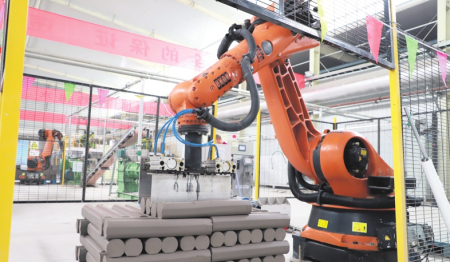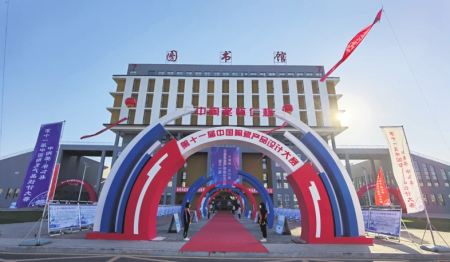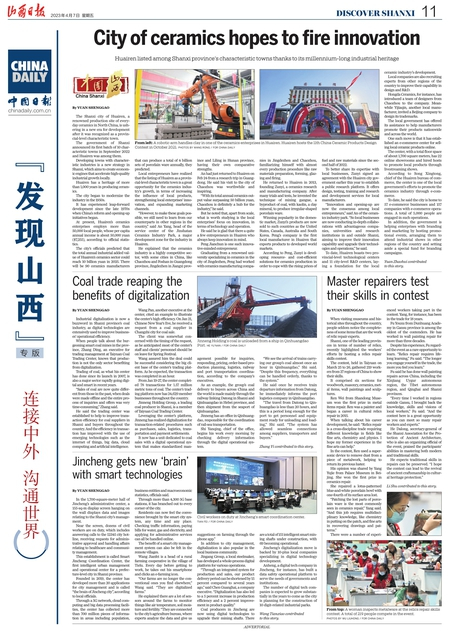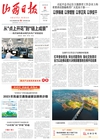City of ceramics hopes to fire innovation
Huairen listed among Shanxi province’s characteristic towns thanks to its millennium-long industrial heritage

A robotic arm handles clay in one of the ceramics enterprises in Huairen.

Huairen hosts the 11th China Ceramic Products Design Contest in October 2021. Photos by Wang Rong / For China Daily

The Shanxi city of Huairen, a renowned production site of everyday ceramics in North China, is ushering in a new era for development after it was recognized as a provincial-level characteristic town.
The government of Shanxi announced its first batch of 10 characteristic towns in September 2022 and Huairen was among them.
Developing towns with characteristic industries is a new strategy in Shanxi, which aims to create economic engines that accelerate high-quality industrial growth locally.
Huairen has a heritage of more than 1,000 years in producing ceramics.
The city began to modernize the industry in the 1950s.
It has experienced leap-forward development since the late 1970s when China's reform and opening-up initiatives began.
At present, Huairen's ceramics enterprises employs more than 50,000 local people, whose per capita annual income is about 50,000 yuan ($7,255), according to official statistics.
The city's officials predicted that the total annual industrial added value of Huairen's ceramics sector could reach 10 billion yuan in 2025. There will be 90 ceramics manufacturers that can produce a total of 4 billion sets of porcelain ware annually, they predicted.
Local entrepreneurs have realized that the listing of Huairen as a provincial-level characteristic town is a great opportunity for the ceramics industry's growth, in terms of increasing the influence of local products, strengthening local enterprises' innovation, and expanding marketing channels.
"However, to make these goals possible, we still need to learn from our counterparts in other regions in the country," said An Yang, head of the service center of the Jinshatan Ceramics Industry Park, a major development zone for the industry in Huairen.
He explained that the ceramics industry is a highly competitive sector, with some cities in China, like Chaozhou and Foshan in Guangdong province, Jingdezhen in Jiangxi province and Liling in Hunan province, having their own comparative strengths.
An had just returned to Huairen on Feb 24 from a research trip in Guangdong. He said his visit to the city of Chaozhou was worthwhile and inspiring.
"With its total annual ceramics output value surpassing 50 billion yuan, Chaozhou is definitely a hub for the industry," he said.
But he noted that, apart from scale, what is worth studying is the local enterprises' focus on innovation, in terms of technology and operation.
He said he is glad that there are quite a few entrepreneurs in Huairen who always keep innovation in mind.
Peng Jianchun is one such innovative-minded entrepreneur.
Graduating from a renowned university specializing in ceramics in the city of Jingdezhen, Peng had worked with ceramics manufacturing companies in Jingdezhen and Chaozhou, familiarizing himself with almost every production procedure like raw materials preparation, forming, glazing and firing.
He returned to Huairen in 2013, founding Zunyi, a ceramics research and manufacturing company. After many trials and tests, he invented the technique of mixing gangue, a byproduct of coal, with kaolin, a clay mineral, to produce irregular-shaped porcelain ware.
Winning popularity in the domestic market, Zunyi's products are now sold to such countries as the United States, Canada, Australia and South Korea. Peng's company is the first local manufacturer in Huairen that exports products to developed world markets.
According to Peng, Zunyi is developing resource- and cost-efficient solutions for ceramics production in order to cope with the rising prices of fuel and raw materials since the second half of 2022.
To better share its expertise with local businesses, Zunyi signed an agreement with the Huairen city government earlier this year to establish a public research platform. It offers design, testing, training and research and development services for local manufacturers.
"Innovation and opening-up are now the consensus among local entrepreneurs," said An of the ceramics industry park. "So local businesses are now conducting in-depth collaborations with advantageous companies, universities and research institutions in and outside of Shanxi, aiming to improve their innovation capability and upgrade their technologies and operations," he said.
To date, Huairen boasts two provincial-level technological centers and 11 city-level R&D centers, laying a foundation for the local ceramic industry's development.
Local companies are also recruiting experts from other regions of the country to improve their capability in design and R&D.
Hongda Ceramics, for instance, has introduced a team of designers from Chaozhou to the company. Meanwhile Yijiaqin, another local manufacturer, invited a Beijing company to design its trademarks.
The local government has offered its assistance to help manufacturers promote their products nationwide and across the world.
One such move is that it has established an e-commerce center for selling local ceramic products online.
The center, with a total floor space of about 1,700 square meters, has 22 online showrooms and hired hosts to promote local products through livestreaming shows.
According to Song Xingtong, chief of the Huairen bureau of commerce, the center is one of the local government's efforts to promote the ceramics industry through e-commerce.
To date, he said the city is home to 57 e-commerce businesses and 157 companies with e-commerce operations. A total of 5,000 people are engaged in such operations.
In addition, the government is helping enterprises with branding and marketing by hosting promotional events, arranging for them to attend industrial shows in other regions of the country and setting aside a special fund for branding campaigns.
Yuan Zhaohui contributed to this story.
By Yuan Shenggao











